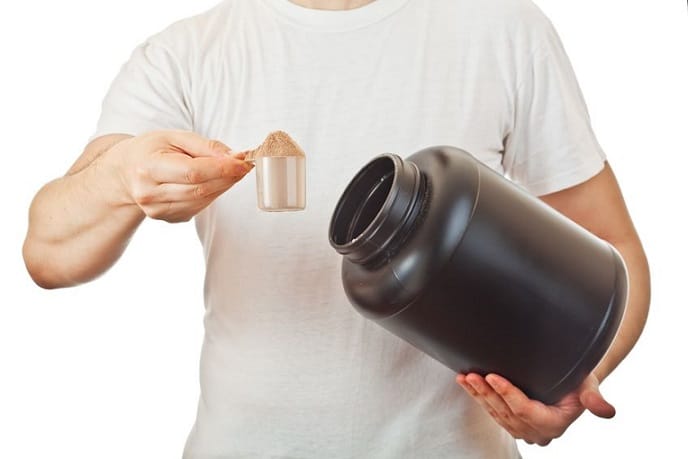 Whether you consider New Years resolutions to be a glorious new dawn, or completely pointless because you could have been doing them anyway, there’s one strategy I absolutely recommend for January 1st, once the partying is done and dusted. It’s focussing on collagen, a name you probably know, but might not understand the sheer potential of.
Whether you consider New Years resolutions to be a glorious new dawn, or completely pointless because you could have been doing them anyway, there’s one strategy I absolutely recommend for January 1st, once the partying is done and dusted. It’s focussing on collagen, a name you probably know, but might not understand the sheer potential of.
You might have spent the last 10 years in acne misery, but at this very moment, you could be just six weeks away from dramatically clearer skin that lasts for decades. All that stands in your way is a few mundane tasks like sourcing a decent vitamin C supplement, and locating a fluoride-free toothpaste.
Maybe you’re already focussed on collagen with the eye of an eagle, but if not, here’s why the time is now.
There’s no daily reminder
The first reason is simply that collagen is easy to underestimate. Generally, the collagen concept feels quite distant and technical.
Sure, it’s connected to youth, but in your day to day life, it’s easy to forget about collagen. Meanwhile, acne is a visible reminder ever day, a constant motivation. You can’t ignore a red and angry pimple – you can see it, you can feel it, you can probably even hear it bubbling away if you concentrate hard enough. With oily skin as well, you’re reminded every time you walk past a mirror or touch your face.
Nobody’s ever made fun of someone in the schoolyard for not having enough collagen. Rest assured though, that collagen is extremely important, even if its basic roles are not readily apparent. Collagen can…
ONE: accelerate wound healing, and therefore pimple healing. The first stage in healing is a fresh layer of type 3 collagen, which is subsequently replaced by sturdier type 1.
TWO: delay ageing. Wrinkles and fine lines manifest after a persistent drop in collagen that begins at age 25 (no, you won’t instantly enter grandma status on your birthday).
THREE: create smoother skin. We’ll discuss this soon.
This protein is a banquet of opportunities. Sure, you can’t see the bricks of collagen flying together and assembling like Lego, and you never see a tiny beam of magical light run along your wrinkles and erase them, but you should never underestimate collagen. If you’ve never focussed on this protein, then now’s the time to start. You have lots of opportunities ahead of you.
It’s a long term project
 The next reason is simple, but extremely important – collagen takes much longer to work than other strategies. Like applying green tea for oily skin, it takes weeks for the wound healing and glow to show up. There’s no time to lose.
The next reason is simple, but extremely important – collagen takes much longer to work than other strategies. Like applying green tea for oily skin, it takes weeks for the wound healing and glow to show up. There’s no time to lose.
What if I told you that a skin tone worthy of Hollywood could only be weeks away for you? Collagen is vital for glow, but here’s the catch – it won’t work overnight. You’ll never eat a tub of gelatin, look in the mirror the next morning and pinch yourself to see if you’re dreaming.
Calming down inflammation is far quicker, sometimes taking only hours, or 2 days if you cut your sugar intake. If the pressure on the immune system subsides, then the pro-inflammatory chemicals behind redness and swelling (TNF-a, IL-8) can vanish rapidly.
Not so for collagen – it’s a more patient, physical process. Inflammatory chemicals circulate the bloodstream freely, whereas skin cells must be steadily constructed and moulded. It’s a spin on the old “your skin replaces itself every two months” concept.
That’s why you should get started on collagen today. Every day delayed is a day with a poorer quality skin tone. The time is now, not tomorrow. You’ll always need to be patient, but just think. Once you’ve sorted the amino acid and vitamin C supplements, dodged toxins, and chosen a natural topical treatment, the countdown has officially started. You can start crossing the days off your calendar until you ascend to the next level of glow.
Get the collagen system in place, leave it on autopilot, and you’ll be inching steadily closer to a subtly better skin tone.
An equally basic reason is that because collagen is a long term project, with its ageing and wrinkle powers, it’s better to enter the game as early as possible. If you seem to be ageing rapidly at age 40, and suddenly dash madly for a gelatin supplement after reading a magazine article, then it will be too late. Not too late for any benefits, which we’ll cover in a minute (so don’t lose hope), but too late to enjoy the full power of laying down that collagen base when you’re 22. That’s the harsh reality, so the earlier you get started with collagen, the better.
An underestimated glow giver
Speaking of your skin tone, that’s another reason to become a collagen obsessive. It’s role in the fabled glow tends to be underestimated.
Maybe you’ve been frustrated about your skin tone for a while, something you can’t pinpoint. Collagen could provide that subtle X factor which your skin seems to be missing.
The fact is, collagen does not actually provide glow, not literally. That all-important task falls to plant antioxidants like beta-carotene, lycopene and epicatechin, thousands upon thousands of pigmented molecules which accumulate in your skin over the years. These antioxidants provide colour to fruits and vegetables, and they do the exact same thing in your face; the acidic fire of the digestive system doesn’t destroy them.
A vibrant skin, a skin that quite simply looks alive in an indescribable way, will be packed with these molecules. A guy might be from a culture that eats loads of pigmented foods, or he might eat normal amounts, but unknowingly be avoiding the free radicals that destroy them. Pieces of the melon you eat will literally end up in your face in two days.
No, collagen is more subtle. Collagen will make every small, tiny and microscopic breach of your face heal much more effectively. It’s the opposite of when a gash on your arm doesn’t heal correctly and leaves a subtle, discoloured mark for weeks. Increasing collagen will make newly constructed skin cells more even and strong, less irregular. This isn’t technically glow, but it’s vital for what appears as glow to the naked human eye. And ultimately, that’s the only thing that matters.
You can’t underestimate the power of glow. Play your cards right, and having the occasional leftover pimple will barely matter anymore. In fact, it’ll be an advantage because you’ll still have one to joyfully burst on your bathroom wall in the morning. It’s amazing what the skin tone beneath everything can do. If it’s grey and lifeless, then two pimples could make you look like an unhygienic computer hacker, while two pimples with a glowing skin tone will be a cute and appealing imperfection.
Overall, collagen is the king of subtle skin quality. Like before though, these benefits can take months to appear. Your skin is constantly recycling its collagen using enzymes like prolidase and MMPs, so the benefits won’t become fully-fledged until you get through a full cycle of this, and a full cycle of tiny red pimples appearing and fading away again.
Everyone can benefit
 The glow powers are separate from ageing too, the classic appeal of collagen. It’s more about blotchiness fading away and being replaced by evenness.
The glow powers are separate from ageing too, the classic appeal of collagen. It’s more about blotchiness fading away and being replaced by evenness.
This leads into the next reason: you can benefit from collagen at any age. Regardless of whether you’re 20 or 70, increasing collagen can add vitality to your skin, and it could do so within weeks.
No, your wrinkles won’t magically fade away. Some things are impossible, but the blotchiness removal service will still show up on time. Old people do have collagen, just not as much, and it can be increased, particularly during the active wound healing stage. There’s no barrier to the glycine, vitamin C and toxin avoidance strategies working for old people. The processes are still the same.
If anything, a subtle glow might be more important for 50+ year olds. Two 60 year old women can have the exact same fine lines and wrinkles, but the one with glow will be deemed to look good for her age, while the glowless woman will be showing her age. It’s all an optical illusion, one you can exploit. It’s identical to the acne looking better concept.
Therefore, it’s not just a case of a youth-obsessed person delaying the inevitable. If you’re 40, you might not have been reaching your full potential for the last 10 years, but you can reach it for the next 20.
The products are deceptive
That feeds into your next reason to start focussing on collagen. It’s hardly an obscure substance these days. Most people with a passing interest in skin quality will know of its connection to youth.
But that’s the thing: most of the “collagen” supplements on the market, or recommended in magazines while you’re waiting for a haircut, encompass only a small portion of the collagen strategy. There’s straight collagen supplements, maybe from fish scales or egg shell membrane.
These do work well, breaking down into collagen’s constituent amino acids (glycine, proline, lysine) and allowing you to recycle them. However, there’s no vitamin C in sight, and there’s no shea butter in sight. There’s no juice that makes fluoride and cigarette smoke bounce off you either.
Generally, the collagen market isn’t a minefield, not too scam-tastic (honey is particularly fraudulent). The problem is that its vision is limited. These “pure collagen” supplements are making people feel prematurely satisfied, when they haven’t reached their full potential yet.
When the bottle literally contains collagen, whether bovine or porcine, it feels doubly satisfying, like you’re cutting to the chase, getting to the root of the problem.
Then you might switch focus to moisturiser, or anti-inflammatory systems, but some people might not get back to collagen for years. At the back of your mind, it feels like you’ve got it covered, and unless you’re a constant experimentation fanatic, you might not devote more than a millisecond of thought to it again.
Don’t fall into this trap! I’d advise you to reconsider your collagen strategy right now. You could have many more opportunities ahead of you. Raw animal collagen is manufactured using vitamin C, just like ours, but the end result contains none.
Your collagen is under ever more pressure
 Speaking of underestimating things, it’s becoming clearer with each passing year that there’s a high number of sneaky collagen inhibitors lurking in our towns and cities, plotting from their underground sewer bases. Cigarette smoke is the best proven, disintegrating collagen by wafting around in your face with all its free radicals, but that’s only a taster.
Speaking of underestimating things, it’s becoming clearer with each passing year that there’s a high number of sneaky collagen inhibitors lurking in our towns and cities, plotting from their underground sewer bases. Cigarette smoke is the best proven, disintegrating collagen by wafting around in your face with all its free radicals, but that’s only a taster.
Fluoride, for example, is a proven collagen snatcher in studies. This toothpaste ingredient somehow twists and distorts the shape of bodily proteins, in their classic molecular coils, and even downregulates the main gene behind type 1 collagen – COL1A1. It’s first in name and first in importance, closing wounds in all but the earliest stages (where type 3 dominates).
The next villain may come as a shock – coffee. Its caffeine can decrease the enzyme called prolidase, which recycles dead proline into new batches of collagen.
The point here isn’t to quit all coffee, which I definitely don’t recommend. The antioxidants from the bean will probably outweigh the caffeine’s hunger for collagen. No, the point is the unexpectedness factor, that other collagen snatchers could be anywhere. What if the pesticide atrazine lowers collagen? 24,000 tons are applied to American crops yearly. What if volatile organic compounds (VOCs) increase the collagen enzyme that recycles existing collagen? VOCs waft around your bedroom whenever you spray deodorant. The average young woman applies 515 synthetic chemicals on her body daily. Thousands of artificial chemicals are used in industry, food packaging, and agriculture, and only a handful have been tested for collagen destruction.
You have to wonder whether this explains the unusually slow ageing of pristine alpine villages. This is just another parallel to environmental toxins pouring fuel on the acne fire. Collagen destruction won’t be quite as common, because the pathways like decreasing prolidase are more specific than cranking up inflammation and lowering antioxidants.
Nevertheless, I would get busy inspecting your collagen situation right away. We’ve had several motivations based on opportunity and now this is one based on fear.
Conclusion
Maybe you’ve cleared most of your pimples, but can’t shake off the feeling that your skin is compromised somehow.
Maybe you’ve convinced yourself that your acne has done permanent damage. Not so – there’s dozens of potential strategies, and collagen is the perfect place to start.
It’s time to shake off the clouds of self doubt and get after that clear skin like a force of nature. Boosting collagen won’t necessarily be a fix all solution for you, but it could easily drag you over the fine line between loving your skin and niggling dissatisfaction.
If you start your collagen strategy and your acne strategy right now, you could reach a tipping point in 4 weeks where everything suddenly comes together.
Thanks for reading!